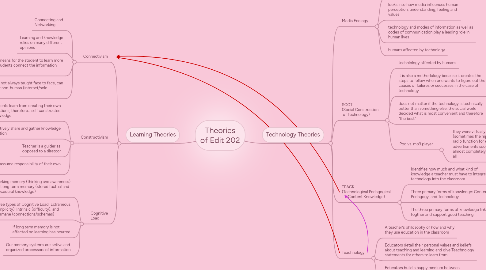
1. Technology Theories
1.1. Media Ecology
1.1.1. many different views on the definition
1.1.2. looks into how media influences human perception, understanding, feeling and values
1.1.3. technology and modes of information as well as codes of communication play a leading role in human lives
1.1.4. humans affected by technology
1.2. SCOT (Social Construction of Technology)
1.2.1. technlology affected by humans
1.2.2. it is also a methodology because it creates the steps to follow when one wants to figure out the causes of failures or successes in the case of technology
1.2.3. does not matter if the technology is technically better than something else, the social world decided what is most convenient and therefore "the best"
1.2.4. iPod vs. mp3 player
1.2.4.1. they were virtually identical in function (sometimes the mp3 player was better,with radio function for example) but Apple's advertisments suceeded and were able to almost completely get rid of the competition at all
1.3. TPACK (Technological Pedagogical Content Knowledge)
1.3.1. Identifies how much and what kind of knowledge a teacher must have to integrate technology into the classroom
1.3.2. Three primary forms of knowledge: Content, Pedagogy, and Technology
1.3.3. The three primary forms of knowledge link togther and support good teaching
1.4. Teachnology
1.4.1. A teacher's philosophy of how and why they use education in the classroom
1.4.2. Educators detail their personal values and beliefs about teaching and learning and give Teachnology statements for others to learn from
1.4.3. Educators build a happy medium between learning done traditionally and learning done using technology
2. Learning Theories
2.1. Connectivism
2.1.1. Connecting and Networking
2.1.2. Learning and knowledge relies on many different opinions
2.1.3. Teacher provides the means for the student to learn more information and the students connect the information themselves
2.1.4. Learning is not always taught face to face, can be done by non-human (internet/solo research)
2.2. Constructivism
2.2.1. Students learn from creating their own questions, therefore... self constructed knowledge
2.2.2. Students actively share and gather knowledge and information
2.2.3. Teacher is a guider as opposed to a diretcor
2.2.4. Learners assume responsibility of their own learning
2.3. Cognitive Load
2.3.1. Working memory (thinking and awareness) vs. Long term memory (stored factual and procedural knowledge)
2.3.2. Three types of Cognitive Load: Extraneous (simplicity), Intrinsic (difficulty), and Germane (connections/schemas)
2.3.3. If long term memory is not affected no learning has ocurred
2.3.4. Our memory systems are active and organized processors of information
